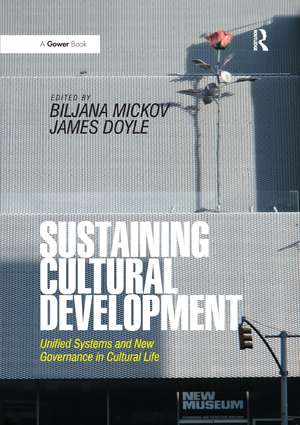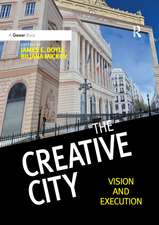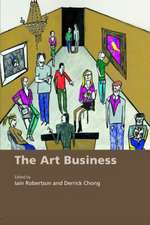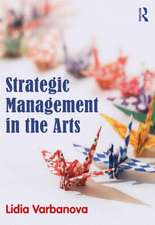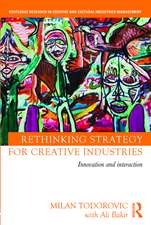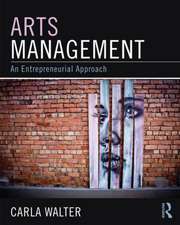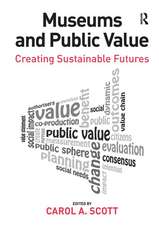Sustaining Cultural Development: Unified Systems and New Governance in Cultural Life
Editat de Biljana Mickov, James Doyleen Limba Engleză Paperback – 26 oct 2016
Preț: 338.33 lei
Preț vechi: 386.77 lei
-13% Nou
Puncte Express: 507
Preț estimativ în valută:
64.74€ • 67.77$ • 53.57£
64.74€ • 67.77$ • 53.57£
Carte tipărită la comandă
Livrare economică 07-21 aprilie
Preluare comenzi: 021 569.72.76
Specificații
ISBN-13: 9781138272606
ISBN-10: 1138272604
Pagini: 274
Dimensiuni: 174 x 246 mm
Greutate: 0.45 kg
Ediția:1
Editura: Taylor & Francis
Colecția Routledge
Locul publicării:Oxford, United Kingdom
ISBN-10: 1138272604
Pagini: 274
Dimensiuni: 174 x 246 mm
Greutate: 0.45 kg
Ediția:1
Editura: Taylor & Francis
Colecția Routledge
Locul publicării:Oxford, United Kingdom
Notă biografică
Biljana Mickov researches cultural policy development, in co-operation with local authorities. She is the editor of New Thought, a bilingual magazine published in Serbia focusing on contemporary culture and is engaged in projects for the Museum of Contemporary Art and Institute for Culture in Novi Sad, Serbia, as well as internationally, in collaboration with European colleagues. Mickov has a degree in geography from the University of Novi Sad and a European Diploma in Cultural Project Management. James Doyle is a cultural manager, a practising artist and an Arts Officer for Dublin City Council. He launched the research website European Public Art Network, which features topical public art issues from around the world and he is a co-producer of d.ploy, an organization undertaking projects focussed at the intersection between creative and cultural industries and economic regeneration. He also ran an independent event management company and was a national representative for events Industry Training in the UK. Amongst other qualifications Jim has a degree in fine art, diplomas in cultural management, physics and chemistry.
Cuprins
Introduction, Biljana Mickov; Chapter 1 How We Value Arts and Culture, John Holden; Chapter 2 Barcelona’s Cultural Policies Behind the Scenes: New Context, Renewed Strategies, Esteve Caramés; Chapter 3 Agenda 21 for Culture, Jordi Pascual; Chapter 4, Jordi Martí Grau, Carles Giner Camprubí; Chapter 5 Cultural Policies, Human Development and Institutional Innovation: or Why We Need Agenda 21 for Culture, Jordi Pascual; Chapter 6 The City of 2030; Chapter 7 Luxembourg and The Great Region: A Cultural Challenge, Luc Braconnier; Chapter 8 The City of Bologna – A City of Culture, Mauro Felicori; Chapter 9, Jim Doyle; Chapter 10 Cork, Culture and Identity – A City Finding its Voice, Leslie Ryan; Chapter 11 To Experience and Create, Nina Gran; Chapter 12 Design: From Making Things to Designing the Future, Ekaterina Khramkova; Chapter 13 City Museum and Urban Development, Blaž Peršin; Chapter 14 Museums and Globalisation, Fabrice Thuriot; Chapter 15 New Challenges for Museum Exhibitions, Jean-Michel Tobelem; Chapter 16 The Visitor Appears, Jonathan Goodacre; Chapter 17 Art, Education and the Role of the Cultural Institution, Mick Wilson; Chapter 18 Art Education Practice, Biljana Mickov; Chapter 19 Marketing Cultural Services for the Public Sector, Maarit Keto-Seppälä; Chapter 20 Creative Industries, Davor Buinjac; Chapter 21 Measure for Measure, Jonathan Goodacre; Chapter 22 Eindhoven – A City as a Laboratory, Cees Donkers; Chapter 23 Afterword, Biljana Mickov;
Descriere
In Sustaining Cultural Development, Biljana Mickov and James Doyle argue that effective programmes to promote greater participation in cultural life require substantial investment in research and strategic planning. Using studies from contributors throughout Europe, they look at ways to promote cultural life as the centre of the broader sustainable development of society. These studies illustrate how combining cultural identity, cultural diversity and creativity with increased participation of citizens in cultural life improves harmonized cultural development and promotes democracy. They indicate a shift from traditional governance of the cultural sector to a new, more horizontal, approach that links cultural workers at different levels in different sectors and different locations. This book will stimulate debate amongst cultural leaders, city managers and other policy makers, as well as serving as a resource for researchers and those teaching and learning on a range of post-graduate courses and programmes.
